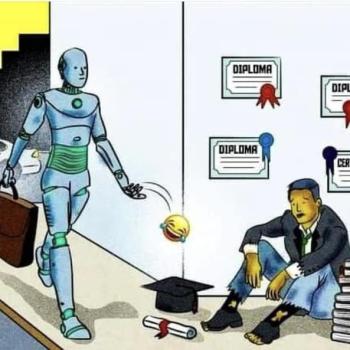Several things came to my attention so that I decided to bring them together in a blog post.
I have to start with an interactive choose your own adventure online learning site that leads you through a shiur (Talmudic learning session) that explores the question of whether a robot can be a person from the perspective of the Jewish tradition, discussing Torah, rabbinic literature, the golem traditions, and much else.
Next is a post about playing Settlers of Catan through the medium of interacting in ancient Greek. Here’s an excerpt:
I’m a big advocate for playing games in a target language. I think it creates a language focus which isn’t the language itself, so that you are communicating about something else, not about language, and that creates a need to use the language actively and passively to express, and negotiate, meaning between speakers. For some time I’d been interested in doing (Settlers of) Catan in Ancient Greek. It’s a great game, which isn’t highly dependent on verbal ability – you could play the whole game in silence if you wanted to, but it offers a limited set of vocabulary and expressions needed for core gameplay. Last term during my Patrologist classes, I’d thought of getting my conversational Greek students to play it, but I’d run out of time to prep and execute it. Not so this term! Catan is easily played online, which makes it also a great game for distanced, online video-chatting learners. We ran a game today, and I think it worked reasonably well. We used the site http://colonist.io, which works reasonably well. It helps to get players familiar with both the game and the website beforehand. Players can play against bots, so they can get in a bit of practice before you do it in-language. I’ve put together a cheat sheet of core vocabulary which you can use if you too want to play in Ancient Greek, I hope it will be of use to you! And, if I’m free, I’m always up for a game myself.
There is an article by renowned New Testament scholar Beverly Gaventa in Christian Century about teaching Greek to her 8-year old grandchild. Brian LePort shared a classroom activity he uses to teach textual criticism. He also shared this:
https://readingthebiblewithigen.home.blog/2020/12/01/the-hermeneutics-of-study-bibles-made-for-children-and-adolescents/
This article about what some call “escape room games” made me ask about ideas for how that kind of elaborate puzzle-games, as well as MMORPGs and RPGs more generally, not to mention customized game pieces and paraphernalia we might have students receive in the mail (in some contexts campus mail would be ideal), and other such things can be used for educational purposes.
A game die was found at Beit-El (aka Bethel) in the West Bank. Or could it have been used for mantic practices/divination? Here’s a photo from the article:

There is more about the die and ancient gaming on the website of Biblical Archaeology Review.
Only tangentially related, let me include some items about AI and other technology that came up in this post or is potentially useful for educational purposes. One is the chatbot, another is the topic of “digital wellbeing.”
Also relevant, directly and/or indirectly:
Catherine Bagwell, Emory University – Remote Learning and School Friendships
Going to College is about More than Mere Job-Preparation
Should Group Work be Optional in Online Courses?
More Tips for Teaching in a Virtual Classroom
Big Data on Campus and Data-Driven Decision-Making
How the Pandemic may Change Teaching for Good
The Ministry of the Future and Higher Education
https://www.thetechedvocate.org/what-will-we-see-from-augmented-reality-in-the-future/
https://www.thetechedvocate.org/are-classroom-robots-the-nextgen-of-learning/
https://www.thetechedvocate.org/successful-ai-examples-in-higher-education-that-can-inspire-our-future/
https://www.thetechedvocate.org/campus-vs-online-where-is-the-future-of-education-located/
https://www.thetechedvocate.org/can-active-collaboration-and-participation-be-achieved-with-digital-tools/
https://www.thetechedvocate.org/4-questions-every-teacher-should-ask-about-mobile-learning/
https://www.thetechedvocate.org/it-trends-to-watch-as-higher-education-moves-into-a-new-decade/
https://www.thetechedvocate.org/higher-ed-it-needs-data-driven-insights-today-not-tomorrow/
Andrew Kahn, SUNY Buffalo State – Story Based Learning: Re-engaging a Disconnected Generation
https://www.thetechedvocate.org/why-blended-learning-will-become-an-educational-norm/
https://www.thetechedvocate.org/why-educators-should-consider-scenario-based-learning/













